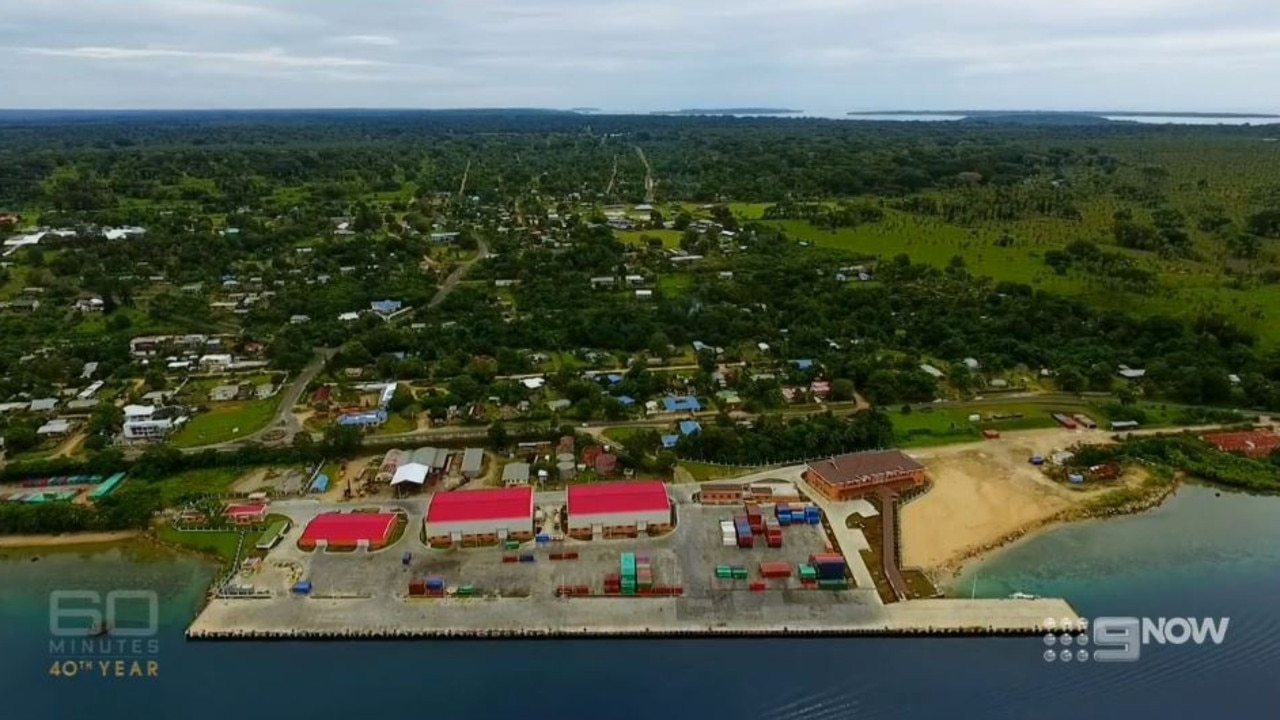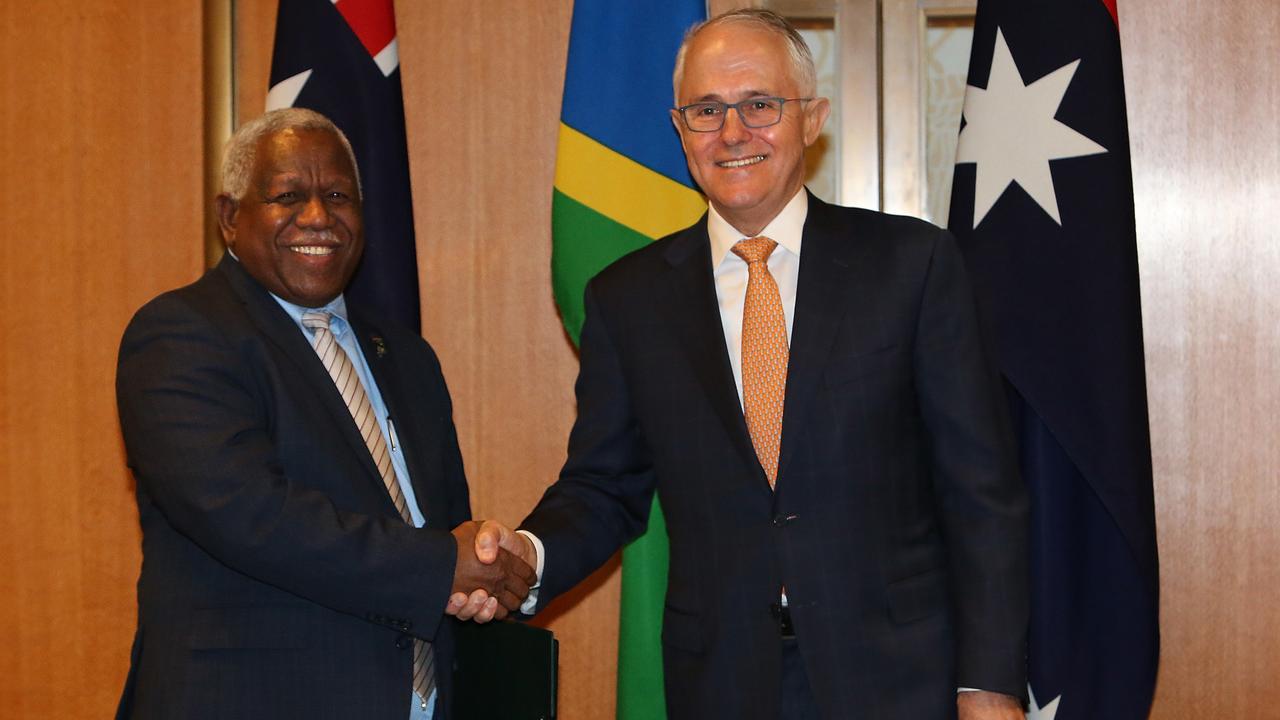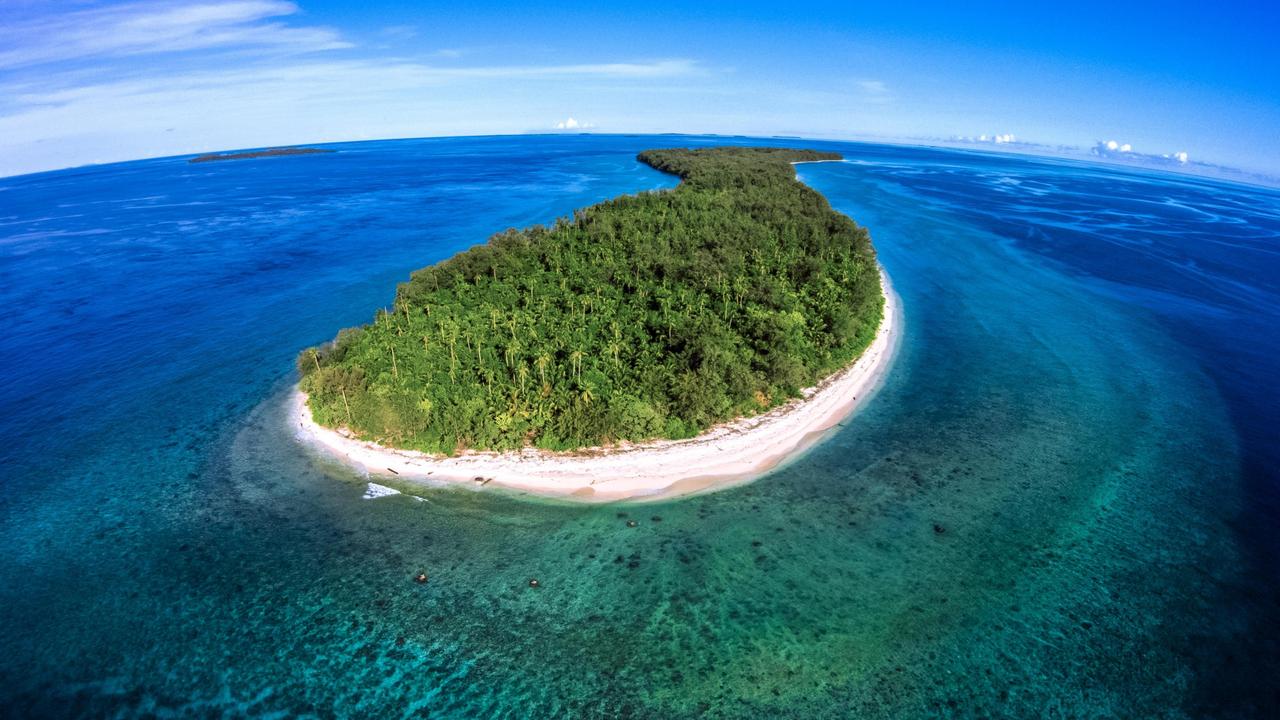The truth about China’s power play in the Pacific
WITH cash to burn, China now has the power to disrupt the rest of the world — and its first targets are a big problem for us.
CHINA finally seems to have completed its coming of age, and now has the power and money to disrupt diplomatic relations around the world.
After decades of taking its neighbours for granted, Australia is starting to wake up to China’s potential to dominate the Pacific region.
The superpower has been splashing its cash and growing its influence in the region at the same time as Australia’s assistance has stalled.
Now some experts warn China could eventually establish a military presence right on Australia’s doorstep.
“It’s got global ambitions and it’s challenging the rules based international order,” security analyst Malcolm Davis told 60 Minutes on Sunday.
“What the Chinese tend to do is that they put heavy investment into countries that simply don’t have the means to pay back the debt.
“So they’re getting countries addicted to debt and then when they call in the debt and the countries can’t pay, the Chinese will take a port or a territory or take an island.”
In places like Sri Lanka and the African nation of Djibouti, China has been granted control over ports after the countries defaulted on massive loans taken out to build the ambitious projects. There are now fears the same pattern will play out in Vanuatu where China has loaned the country $114 million to build a wharf at Luganville — the site of America’s second largest base in the Pacific during World War II.
While the port was built to attract cruise ships to the region, one expert points out it is big enough to accommodate foreign naval ships including guided missile destroyers, cruisers and even aircraft carriers.

“The Chinese wouldn’t be building all this just to cash in on a very limited tourist market,” Dr Davis said. “They’re thinking commercial influence, political influence and ultimately a military presence.
“If the Chinese were to bring naval forces into this region, it fundamentally changes our strategic outlook in a way not seen since the 1940s.”
Director of the East Asia Program at the Lowy Institute, Merriden Varrall told news.com.au that Australia seems to have had taken the region for granted but this was likely to change now that other countries had stepped up their presence.
“I think it has been rather overlooked in the past and rather taken for granted by Australia,” she said.
But while China’s aid in the region was significant, it was no where near what Australia contributed.
Dr Varrall also defended some of the failed Chinese projects and said there were many organisations working in the area with very different agendas. Some organisations were motivated simply by financial gain but others seemed genuine about their aims to improve life for Pacific Islanders.
“From my own experience working with the Ministry of Commerce from China … there’s a lot of altruism,” she said.
Projects may not always have the best outcomes but sometimes this was due to a lack of experience.
“There’s a lot of reasons why Chinese aid and infrastructure can go awry but it’s not always because they’re rogue development actors,” she said.
Australian National University’s Development Policy Centre deputy director Matthew Dornan agreed and said he thought the commercial motivations of Chinese companies were also often overlooked.
“In my view that’s the thing that’s most often underpinning these projects,” Dr Dornan said. “It’s too often portrayed as a big geopolitical play and that’s often not the case.”
Vanuatu Foreign Minister Ralph Regenvanu admits the country made mistakes on some projects it has done with China but says it would never give China a military base in Vanuatu.
“We are a non-aligned country … so this big power play that’s happening in which China is involved, in which Australia is involved, Vanuatu wants to be no part of it,” Mr Regenvanu said.
WHY IS THE PACIFIC IMPORTANT?
Dr Dornan said there were many reasons why the Pacific was important strategically.
For Australia, the most important islands were the ones that were the closest: Papua New Guinea, Vanuatu and the Solomon Islands.
From China’s perspective, Dr Dornan said those same islands were also important, as well as Fiji, as they had the most minerals and natural resources.
But while the strategic aspects of China’s interest in the region have been highlighted recently, Dr Dornan believes they have been over-hyped.
“I don’t think (the region) is enormously important to China,” he told news.com.au.
“The amounts of aid they provide are still not huge. Australia provides a lot more.”
According to the Lowy Institute, China spent $2.2 million on 218 projects in the Pacific between 2006 and 2016. This is a lot less than the $10 million Australia contributed.
China actually gives a lot more money to African nations.
“I don’t think the Pacific tops its list in terms of strategic importance, even if it does for Australia,” Dr Dornan said.
While the Pacific may not be high on China’s agenda, Australia appears to have woken up to the importance of the region to its own interests.
Foreign Minister Julie Bishop recently returned from a bipartisan trip to some Pacific nations with Labor shadow minister Penny Wong. They visited Palau, the Federated States of Micronesia and the Marshall Islands.
Ms Bishop has denied that the trip was aimed at countering Chinese influence but in an interview with Fairfax media, acknowledged that China’s construction of roads, ports, airports and other infrastructure in the region had triggered concern that small Pacific nations may be saddled with unsustainable debts.
“We want to be the natural partner of choice,” Ms Bishop told Fairfax Media on Tuesday.
“We want to ensure that they retain their sovereignty, that they have sustainable economies and that they are not trapped into unsustainable debt outcomes.
“The trap can then be a debt-for-equity swap and they have lost their sovereignty.”
Australia is aiming to provide the counterbalance to the influence of other nations in the region, including Russia.
Australia has also stepped in to build a high-speed underwater communications cable project to connect the Solomon Islands and Papua New Guinea to Australia.
The Solomon Islands had originally made a deal with Chinese company Huawei in late 2016 to construct the fibre-optic cable, to improve the country’s often unreliable internet and phone services.
But Solomon Islands Prime Minister Rick Houenipwela said earlier this month there had been a change of heart following “some concerns raised with us by Australia”, without elaborating.

Ms Bishop refused to detail what concerns Canberra had with telecom giant Huawei.
“I would not elaborate on security issues, that’s not appropriate,” she told reporters.
“What we have offered the Solomon Islands, and they have accepted, is an alternative to the offer, and ours is cheaper. It’s likely to be a faster result for them, and technically superior.”
Huawei has long disputed claims of any links to the Chinese government but it was blocked from bidding for contracts on Australia’s national broadband project in 2012, reportedly due to concerns about cybersecurity.
In another sign of the importance Australia is now putting on its relationship with its Pacific neighbours, it has bumped up its foreign aid spending in the region to its highest ever, from $1.1 billion to $1.3 billion.
This is in contrast to the heavy cuts it has made to the overall aid budget since 2015/16, which have hit countries in Africa and the Middle East in particular.
‘WE COULD HAVE PAID MORE ATTENTION’
While Dr Dornan does not think Australia has completely dropped the ball in the Pacific, especially as it has largely maintained aid to the region, it could be doing more and not just when it comes to foreign aid.
“Certainly I think Australia could have paid more attention to the region and been responsive to what the region would like from Australia,” he said.
This includes considering the region’s requests for its citizens to be able to work more freely in Australia, as well as addressing its concerns about climate change — instead of making them the butt of jokes.
In 2015, Immigration Minister Peter Dutton was caught on tape joking about Pacific Islanders and that “time doesn’t mean anything when you’re about to have water lapping at your door”.
“Political leaders have been insulting to the Pacific and those little things, they might not sound like much, but they are hugely important because Australia is a giant in the region and it’s very easy to offend by making inappropriate comments,” Dr Dornan said.
“I think Australia could have done more to strengthen relations in the region but I don’t think it necessarily means more aid.”
Dr Dornan said New Zealand had a special migrant category for Pacific Islanders in recognition of its history as a colonial power in the region.
“Australia also has that history but there are very few Papua New Guineans in Australia despite being our neighbour,” he said.
He also believed links between Australian and Pacific Islander peoples should be improved.
“Generally the public’s understanding of the Pacific in Australia is limited,” he said. “We are not taught about the Pacific like we are taught about the history of Europe.”
While Pacific Islanders had a good understanding of Australia because it was such a large country, the reverse was not true.
“It’s very hard to have strong relationships with countries with no common understanding,” he said.
But he said he thought the biggest challenge that would impact the ongoing relationship was climate change.
“It’s hugely important for the Pacific, it’s an existential problem for some countries which may disappear in the future,” he said.
“The federal government has really been dragging the chain on climate change action, it won’t be resolved easily but I think Australia could do more, and that would help to improve relations with the Pacific.”

charis.chang@news.com.au | @charischang2
— With AAP




